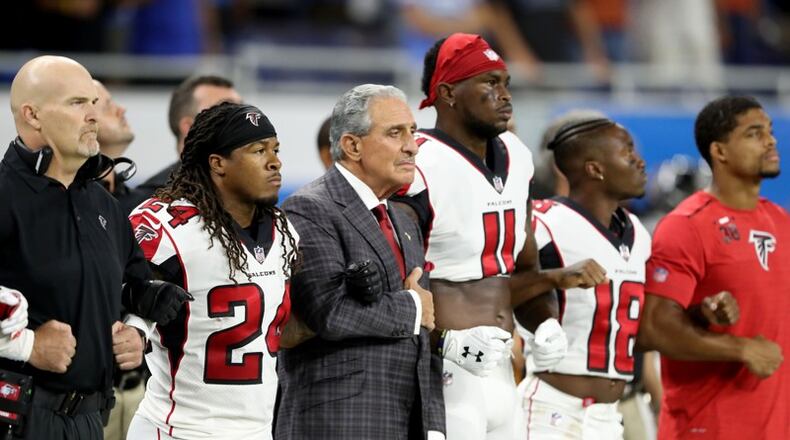Falcons owner Arthur Blank called the NFL’s national-anthem dilemma “complex” while also adding that players should be able to exercise their Constitutional rights under the First Amendment.
“Players do have First Amendment rights,” Blank said Friday before the Falcons’ first day of training-camp practice. “If you talk to many members of the military they’ll tell you what they fought for also was not just the flag or fabric, but what is stands for. It stands for our Constitution and the Bill of Rights.”
The NFL and the NFLPA, the player’s union, are meeting to come up with a solution.
“It’s a complex issue,” Blank said. “It’s complex enough that when you try to sort it out with the players, stadiums, owners and fans. When you have a president that has the biggest mic in the room that can take it different directions for his own reasons, it becomes very difficult.
“We have to worry about doing the right thing for our flag, the right thing for our players and the right thing for fans.”
The NFL and the NFLPA released a joint statement on the issue.
“A short time ago, the NFL and NFLPA concluded a constructive meeting regarding the anthem policy and the very serious social justice issues that have been the basis of some players' protests,” the statement read. “We are encouraged by the discussions and plan to continue our conversations.”
The Falcons players stood most of the time last season. After Trump made derogatory comments about NFL players last season, Grady Jarrett and Dontari Poe knelt for one game. Poe no longer is with the team.
“We’ve asked players to stand for the national anthem with their hand over their hearts, and they’ve done that, except for one game where we had a couple of players kneel and that was basically it,” Blank said. “We are very committed to the military and the flag.”
Blank doesn’t appear to want to fine players who elect to kneel in protest of racial and social injustices.
“If you have players that still feel that’s the way to express themselves, they will,” Blank said.
The Falcons are involved in several social-action programs in communities in and around Atlanta.
“I think on our roster they’ve seen the progress that we’ve made collectively in terms in the social-injustice issues, both the players, our ownership, franchise and coaches alike, so I don’t think you’ll see that much,” Blank said. “It’s far better to have somebody make those decisions themselves then to hit them over the head with a hammer.”
About the Author
Keep Reading
The Latest
Featured



